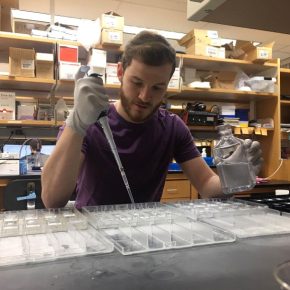Investigator Led Trials on the Horizon for Pancreatic Cancer
 Joseph Murphy
Joseph Murphy
Over the past two years, through collaboration between Breakthrough Cancer Research and Dr David Linehan of the Wilmot Cancer Institute (Rochester, NY), we have been investigating novel strategies for harnessing the patient’s immune system to fight pancreatic cancer. Our research involves targeting features of pancreatic tumours known to prevent recognition by the immune system.
Our recent work has shown that a novel immune therapy that excludes suppressive myeloid cells from tumours, provides an anti-tumour response in pre-clinical models. This has directly resulted in an upcoming Phase 1 clinical trial for patients who have completed first-line chemotherapy.
Additionally, we have shown that a novel immune modulator that stimulates T-cells to infiltrate and recognise tumours, can be coupled with clinically available immunotherapeutic agents such as anti-PD1. This treatment has been shown to be effective in other cancers but our team has recently shown that it can also be effective in pancreatic cancer. This has resulted in an upcoming Phase 1 clinical trial for use alongside chemotherapy and other immunotherapies in patients with metastatic disease.
Finally, we are using immunotherapies to augment radiation therapy. 50% of all cancer patients may be given radiation therapy over the course of their treatment. This has been shown to reduce tumour growth while activating the immune system. Research by Dr Scott Gerber and our lab has investigated an advanced form of precise radiation that reduces toxic side effects while engaging the immune system via local delivery of a drug that stimulates the immune system. This drastically reduced tumour size in pre-clinical models and has resulted in excellent immune activating properties. This novel research has led to an upcoming Phase 1 clinical trial for patients with locally advanced or metastatic disease.
Back









 Contact
Contact